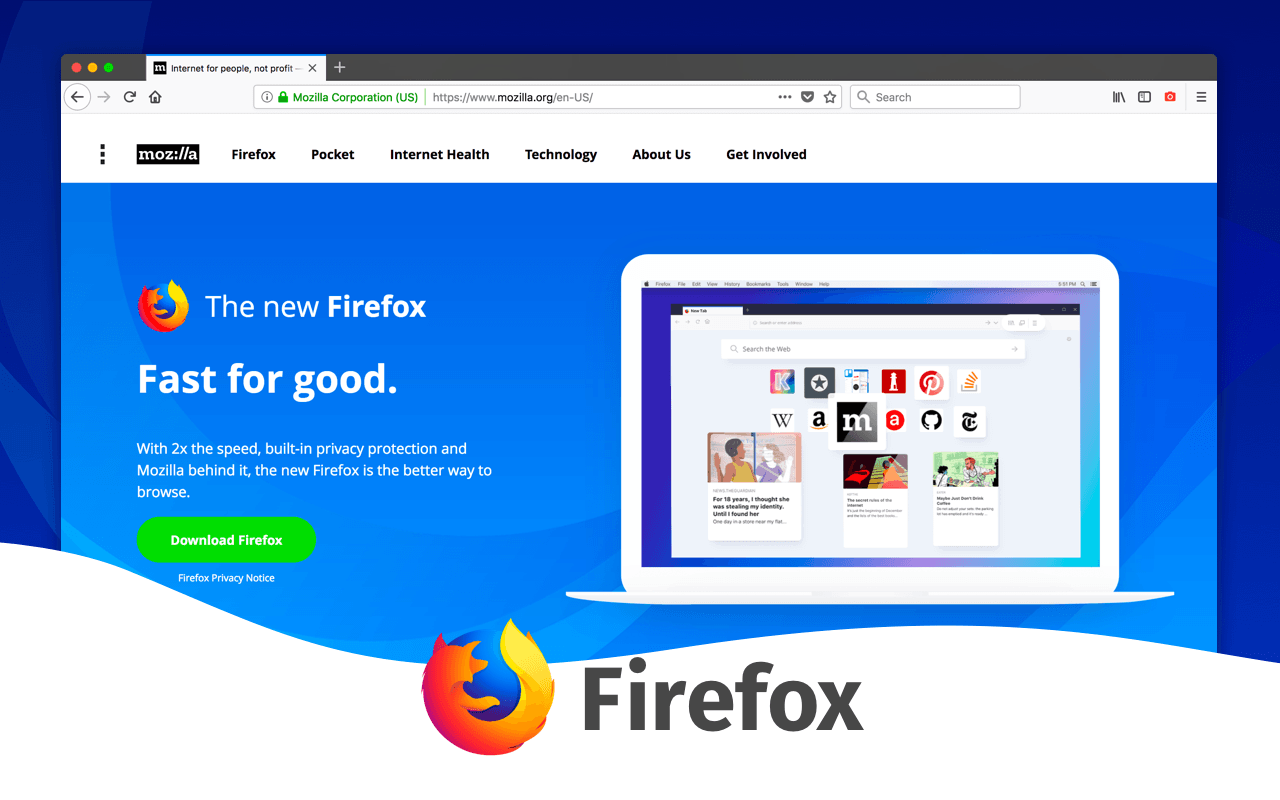Firefox dates back to the early days of the Internet in its current manifestation. Created as an open source project in 2002, by a group of developers working for and with Netscape in 1998, before they were bought by AOL. The Mozilla community set about creating a web browser that would challenge Internet Explorer, making it the successor to the original Netscape Navigator.
Google’s biggest rival
Jan 23, 2018 Mozilla Releases Firefox 58 for Mac With Performance Optimizations. Tuesday January 23, 2018 1:59 PM PST by Juli Clover. Mozilla today announced the launch of Firefox 58. Firefox keeps getting faster as a result of significant updates to SpiderMonkey, our JavaScript engine, you will now experience improved page load performance by up to 15%, page responsiveness by up to 12%, and reduced memory usage by up to 8%. Firefox has been working hard on its Quantum-branded. And thus use fewer resources. Keep in mind, but you may sacrifice quality for gaining a little extra performance out of your Mac.

Firefox was then launched in 2004, earning over 60 million downloads in 9 months. It has grown in popularity over the years, with people using it on laptops, tablets and mobile devices, now with over half a billion users worldwide across every device and platform. However, it isn't a perfect browser, and at times we are forced to ask why is Firefox so slow?
Thankfully, there are a number of ways you can speed up and improve the experience, and improve Firefox performance.

Here are a few ways to quickly and easily speed up Firefox on a Mac.
How to speed up Firefox?
1. Use hardware acceleration
Hardware acceleration is when a browser uses a computer’s GPU to load pages more quickly, which is something you can do with Firefox Quantum. For quite a few computers, this is something that isn't automatically enabled, so you need to do this manually. Here is how:
- Launch Firefox
- Go to About > Preferences
- Within General, scroll to Performance
- Uncheck this box: Use recommended performance settings
- Now check the Use hardware acceleration when available box
- Underneath it is an option you can modify known as Content process limit;
- Use this to decide how much GPU to let Firefox use if you've got the capacity, if you think anything more than 4GB is needed (which is the minimum default setting).
Enabling hardware acceleration and content processing limits are the first things you should check if you want to speed up how Firefox operates. However, there are other ways to improve the speed and overall performance of Firefox.
Firefox Performance Tab
2. Delete Internet plugins
One of the things slowing Firefox down could be Internet Plugins and Launch Agents — small background apps that you aren't even aware of. Some of these could be malware or viruses, so it’s worth checking what internet plugins you've got and deleting any that aren't needed. Here is how you can do that with software — we’ll be using the free version of CleanMyMac by MacPaw.
- Open CleanMyMac X (download a free edition here)
- Click the Extensions tool
- Click Internet plugins
- Select which ones to delete
Now test how quickly Firefox is running.
Also, click the Maintenance tab and disable unneeded Launch Agents.
3. Switch off data collection
Something else slowing Firefox down is the automated anonymous collection of browser data being transmitted back to the Mozilla Foundation and Corporation. If you want, this can be switched off.
- Launch Firefox
- Go to About > Preferences
- Click on Privacy & Security
- Scroll down to Firefox Data Collection and Use
- Now uncheck all boxes in this to ensure that nothing goes back to the Mozilla Foundation and Corporation
- Restart Firefox, and again with this small improvement it should be operating faster.
4. Switch off Accessibility Services
Another way Firefox is always looking out for its users is through something called Accessibility Services. For those who need need assistive technologies for physical impairments - such as poor eyesight or dyslexia - this can be incredibly helpful as not every website has features built-in that make the browsing experience accessible for everyone.
Optimize Firefox Performance
But for those who don't need this assistance, switching off this feature can further accelerate the speed of Firefox, which is equally useful.
- Launch Firefox
- Go to About > Preferences
- Click on Privacy & Security
- Check the Prevent accessibility services from accessing your browser box
- Now restart Firefox
5. Run Mac Maintenance Scripts
Another way to speed up the performance of Firefox is by running maintenance scripts. Here is how you do that, with a useful app we've mentioned earlier, CleanMyMac X:
- Download CleanMyMac X (get a free download, here)
- Click on Maintenance
- Let the app identify what needs fixing and make quick automatic improvements
- Now restart Firefox
CleanMyMac X is an incredibly useful app for improving Mac performance. It works just as well with native macOS apps and third-party apps, such as Firefox. It can fix and identify problems. Safely delete malware and viruses. Clean up clutter and systems junk, and get your Mac working as good as new again: fine-tune your Mac with CleanMyMac X.
With a few tweaks and improvements, you should be able to get Firefox running faster. Giving it a boost will improve your browser experience, which means you can work quicker.
